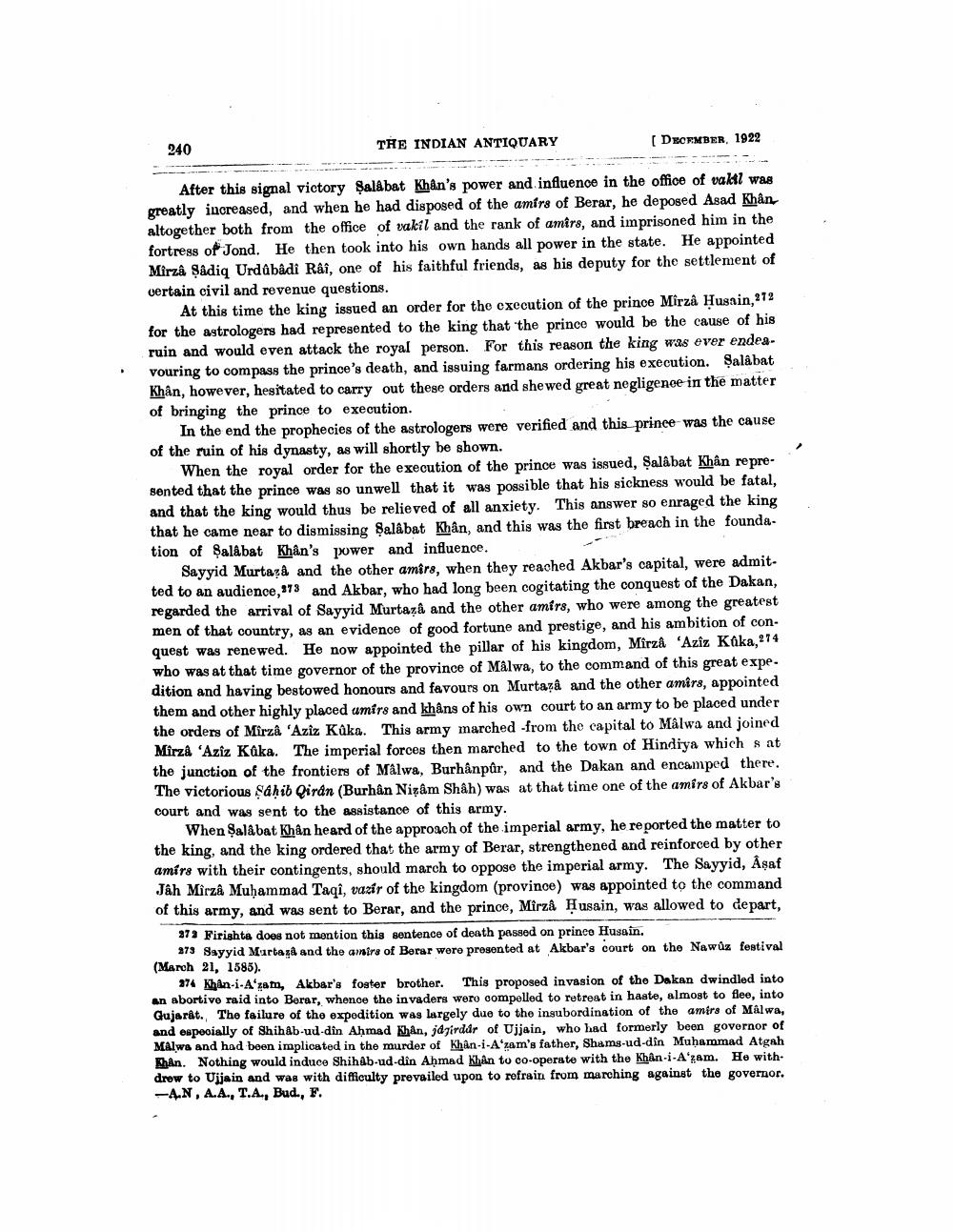________________
240
THE INDIAN ANTIQUARY
[ DECEMBER, 1922
After this signal victory SalAbat Khan's power and influenoe in the office of valiti wag greatly increased, and when he had disposed of the amfrs of Berar, he deposed Asad Khân altogether both from the office of vakil and the rank of amirs, and imprisoned him in the fortress of Jond. He then took into his own hands all power in the state. He appointed Mirzâ şâdiq Urdâbâdi Râi, one of his faithful friends, as his deputy for the settlement of certain civil and revenue questions.
At this time the king issued an order for the execution of the prince Mirza Husain, 272 for the astrologers had represented to the king that the prince would be the cause of his ruin and would even attack the royal person. For this reason the king was ever endesvouring to compass the prince's death, and issuing farmans ordering his execution. Salabat Khân, however, hesitated to carry out these orders and she wed great negligence in the matter of bringing the prince to execution.
In the end the prophecies of the astrologers were verified and this prince was the cause of the ruin of his dynasty, as will shortly be shown.
When the royal order for the execution of the prince was issued, Salábat Khân represented that the prince was so unwell that it was possible that his sickness would be fatal, and that the king would thus be relieved of all anxiety. This answer so enraged the king that he came near to dismissing Salábat Khân, and this was the first breach in the foundation of Salábat Khân's power and influence.
Sayyid Murtard and the other amirs, when they reached Akbar's capital, were admitted to an audience, 973 and Akbar, who had long been cogitating the conquest of the Dakan, regarded the arrival of Sayyid Murtaza and the other amirs, who were among the greatest men of that country, as an evidence of good fortune and prestige, and his ambition of conquest was renewed. He now appointed the pillar of his kingdom, Mirza 'Aziz Kaka, 214 who was at that time governor of the province of Malwa, to the command of this great expe. dition and having bestowed honours and favours on Murtaza and the other amirs, appointed them and other highly placed amirs and khâns of his own court to an army to be placed under the orders of Mirza Aziz Kaka. This army marched from the capital to Målwa and joined Mirzê 'Aziz Kaka. The imperial forces then marched to the town of Hindiya which s at the junction of the frontiers of Mâlwa, Burhanpûr, and the Dakan and encamped there. The victorious sahib Qirán (Burhan Nizam Shah) was at that time one of the amirs of Akbar's court and was sent to the assistance of this army.
When Şalábat Khan heard of the approach of the imperial army, he reported the matter to the king, and the king ordered that the army of Berar, strengthened and reinforced by other amirs with their contingents, should march to oppose the imperial army. The Sayyid, Agaf Jáh Mirza Muhammad Taqi, vazir of the kingdom (province) was appointed to the command of this army, and was sent to Berar, and the prince, Mirza Husain, was allowed to depart,
373 Firishta doos not mention this sentence of death passed on prince Husain.
373 Sayyid Murtaza and the anirs of Borar were presented at Albar's court on the Nawaz festival (March 21, 1585).
374 Khan-i-A'zam, Akbar's foster brother. This proposed invasion of the Dakan dwindled into an abortivo raid into Borar, whence the invaders were compelled to retreat in haate, almost to flee, into Gujarat. The failure of the expodition was largely due to the insubordination of the amirs of Malwa, and especially of Shihab-ud-din Ahmad Khan, jdzirddr of Ujjain, who had formerly been governor of MAlws and had been implicated in the murder of Khân-i-A'zam's father, Shams-ud-din Muhammad Atgah Khan. Nothing would induce Shihab-ud-din Ahmad Khan to co-operate with the Khân.1-A'zam. He with drow to Ujjain and was with difficulty prevailed upon to refrain from marching against the governor. -AN, A.A., T.A., Bud., F.




